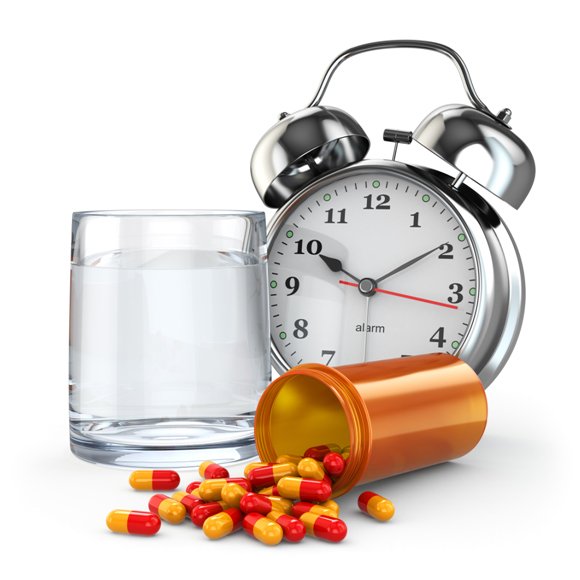My mother had her thyroid removed in her early 50s and took a thyroid replacement medicine for the last 30 years of her life. The sticker on the side of the bottle said to take it in the morning on an empty stomach, but she would often forget and eat breakfast before she realized that she hadn’t taken it yet. As she got older, her thyroid levels kept bouncing up and down, and one day I asked her how she was doing on her thyroid pill before breakfast. “I don’t always remember, Lulu, so sometimes I have to wait until the next day to take it.”
“Wait! Are you saying if you forget to take it before breakfast, you don’t take it AT ALL? Not even with breakfast?”
“No, I don’t. See, it says right there on the label it has to be on an empty stomach in the morning.”
She was skipping at least one dose a week because she forgot to take it before she started eating. To get around this, we moved all of her her once-a-day pills to the same time with her breakfast and within 2 months she had more energy and her thyroid level stabilized.
Medicines that cause drowsiness, dizziness or light-headedness may be less bothersome if they are taken close to bedtime, when you can “sleep through” those annoying side effects. Some examples of these are medicines that regulate heart rate, prevent seizures or treat chronic pain. Certain blood pressure medicines like doxazosin or terazosin used to help prostate problems often cause dizziness and should be taken at bedtime if at all possible. Because our bodies make cholesterol at night while we sleep, the group of cholesterol-lowering medicines called statins is just a little bit more effective at lowering cholesterol if you take them in the evening or at bedtime.
My mother was afraid something bad would happen if she took her thyroid medicine with food instead of before breakfast, but most of the time, taking your medicine with food is a GOOD idea. Food cushions the lining of your stomach and intestines from the irritation many medicines can cause. There are only a few medicines that need an empty stomach, including an older antibiotic called tetracycline and bone building medicines like Fosamax® (alendronate), Actonel® (risedronate), and Boniva® (ibandronate). Luckily, these medicines also come in once weekly, and once monthly formulations.
Here are 5 Tips on Choosing the Best Time to Take Your Medicine:
- Make it consistent.
Instead of trying to juggle before and after meals, if you take your medicine the exact same way every time, it will still be better than skipping the whole dose completely, like my mother did. Getting part of a dose every time is better than get NO dose at all.
- Make it simple.
Medicines that you’re taking twice or three times a day might be able to be lumped into one or two doses by switching to a longer acting formulation, making it simpler and easier to remember to take them consistently. The heart medicine metoprolol is an example of this; the long acting succinate version is usually taken once daily compared to the tartrate formulation which is usually taking twice daily.
- Make it convenient.
Many clinicians will tell you to take your blood thinner warfarin in the evening, which is convenient for hospitals, nursing homes and assisted living facilities. Although it usually allows any changes to take place the same day, it’s more important that you take it at a time of the day that you’re least likely to forget. Many people are busy at 5 or 6 PM in the evening with dinner plans and can easily miss doses. If bedtime doesn’t work well for you try taking it with your morning pills.
- If possible, take your medicines with food.
Taking medicines with food or right after a meal will cause much less stomach upset than taking them on an empty stomach. This is especially helpful with prednisone, antibiotics like amoxicillin or Augmentin® (amoxicillin/clavulanate), narcotics or opioid pain medicines like codeine or oxycodone, and anti-inflammatory pain medicines called NSAIDs, like ibuprofen, naproxen, and aspirin.
- Ask for advice.
Taking some medicines with food will inactivate them, like bone-building drugs like Fosamax® (alendronate) as well as some older antibiotics like tetracycline. For best results, make sure to ask your pharmacist how and when you should take your medicines.


